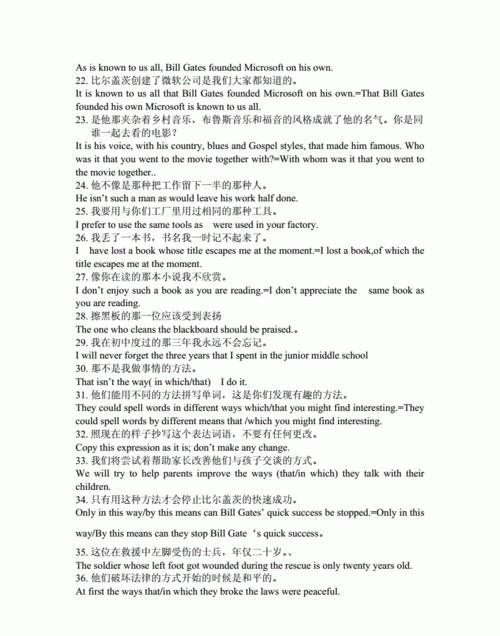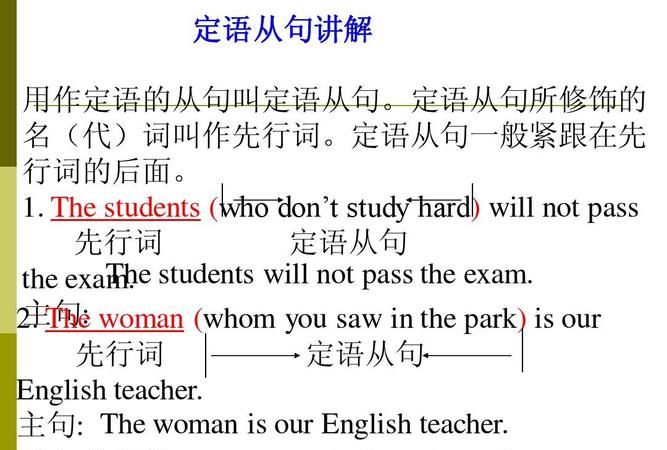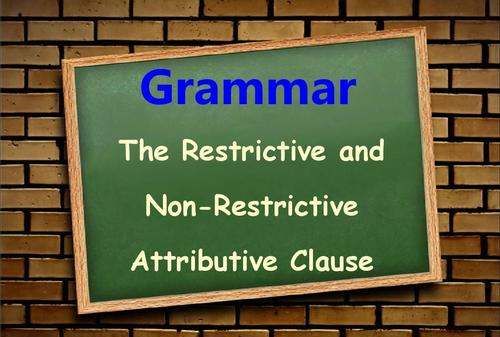本文目录
双重定语从句例句英语
双重定语从句例句1
例句:
1.He was a man whom all his friends admired and who won the respect even of his enimies. 他是个令其朋友全都钦佩的,甚至赢得敌人尊敬的人。
2.He wants you to know that anyone who chooses the path he has chosen is sure to have periodic holiday in jail.他希望你了解,凡是选择了他所选择的那条道路的人,肯定会要定期地到监狱里去度假的。
3.I am the infamous creature you have heard of that lives among the thieves. 我就是你们曾经听说过的那个声名狼藉,跟盗贼为伍的女人。
4.Just consider that we use hardly one hundred thousandth of the heat that there is in coal and could be extracted from it. 请想一想,储藏在煤里并可以提取的热量,我们用的还不到十万分之一
5.He's the person (whom)I meet at the club every day and whom I've invited home to dinner tonight. 他是我每天在俱乐部碰到的那个人,我已邀请他今晚到我家进餐。
定语从句误区提醒:
1)当表示时间或地点的名词作先行词时,要判断出它们在从句中作状语还是主语或宾语。作状语时用关系副词,反之用关系代词。
典型例题:I can never forget the day _______ we worked together and the day ______ we spent together.
A. when; which B. which; when C. what; that D. on which; when
答案:A
解析:两个先行词the day都是表示时间的名词,但第一个空白处要填的关系词在从句中作状语,因此要用关系副词when.第二个空白处要填的关系词在从句中作动词spent的宾语,因此要用关系代词which或that来引导定语从句.
2)当主语为物时,不能用what
3)there be句型中,指人用who指物用that。
4)当主句中缺少主语或表语时,用the one。
5)当出现先行词+介词时,关系词只能用whom或which
6)当出现先行词+介词时,注意判断介词与从句谓语是否有关系,以确定为定语从句
双重定语从句例句2
英语中的双重定语从句指一个句子中含有两个定语从句,其层次不同,修饰的先行词也不同。我们将这种情形称之为:双重定语从句。如:
(1)The boss at last got a chance to visit the village (where he used to work)定语从句1,(which he had been dreaming of for 20 years.)定语从句2
老板终于得到机会去访问他工作过的村庄,他一直梦想了20年。
(2)America has more than fifty states,(one of which,Kentucky,)定语从句1(is the place where Abraham Lincoln was born.)定语从句2
美国有50多个州。其中之一的肯塔基州是林肯出生的地方。
有时, 这种双重定语从句可以一个短语加上一个定语从句,构成双重定语。如:
She has a dream (of becoming a dancer)定语1,(which is what her fatherexpected her to before his death.)定语2
定语1为介词短语作定语,定语2为定语从句,修饰dream。
有时,这种双重定语的定语从句可以另一种形式出现。如:
She has a dream (of becoming a dancer,)定语1 one (that is what her father expected her to before his death.)定语2
定语1为介词短语作定语,one为dream的同位语,定语2为定语从句,修饰one。
从上我们可看到,句子出现双重的定语从句的现象,无疑在更丰富地表达意思的同时,也增加了读者理解句子的难度,尤其对于英语初学者而言, 因此我们不可忽视这种想象。那么,英语中除了“双重定语从句”,还有那些“双重结构”呢?每种双重结构又要注意哪些方面呢?
一、双重宾语
指有些动词短语,短语本身含有一个宾语,加上短语的宾语构成双重宾语。这种动词短语往往可演变成两种不同的被动语态形式,或两种不同的定语从句,使得句子较难理解,加深学生解题的难度。
(1)We should make full use of presently-existent natural resources.
被动1:Full use should be made of presently-existent natural resources.
被动2:Presently-existent natural resources should be made full use of.
(2)We should be clearly aware of presently-existent natural resources we should make full use of.
or:We should be clearly aware of presently-existent natural resources which should be made full use of.
避免出错的方法:
1.找准主词,理清句子结构;
2.谨防使用被动语态时,遗漏相应的介词。
如:What we should attach importance is that many natural resources can’t be produced again.(×)
What we should attach importance to is that many natural resources can’t be produced again.(√)
You can take whichever measure you consider it is the best.(×)
You can take whichever measure you consider is the best.(√)
(把it删去,因为它与measure的成分重叠。我们可把you consider看作插入语,即,whichever measure is the best,you consider.)这种短语常见的如下:
make use of...
pay attention to...
make the most of...
attach importance to...
devote one’s life to...
fix one’s eyes/mind/attention on...
双重宾语转变成的被动形式,是指有两种被动形式,有别于以下第二点所指的双重被动。请看这两种类型的主、被动形式:
(1)双重被动:
The rules in the library allows readers to take the book out of the library.
被动:The book is allowed to be taken out of the library.
(2)双重宾语的被动:
We should make full use of presently -existent natural resources.
被动1:Full use should be made of presently-existent natural resources.
被动2:Presently-existent natural resources should be made full use of.
二、双重被动句
指除谓语动词用被动外,再加上被动的动词不定式,即构成了双重被动句。注意双重被动句的主语既是谓语动词动作的承受者,又是后面谓语动词动作的对象。
(1)The books are not allowed to be taken out of the reading room.
这些书不准带出去阅览室。
(2)His brother is said to have been born abroad.
他弟弟据说是在国外出生的。
三、双重疑问句
指一个句子中包含两个问句,一主一从,但实际上只表达一个疑问的句子。常使用以下结构:
do you think
疑问词+ can you guess等+陈述句?
did you say
此结构又称复杂疑问句,常用来征询对某一疑点看法、判断、认识、猜测和请求。表疑问的插入语可位于句中或句末。作题时要防止插入语干扰对句子结构的整体理解。
(1)What do you think are the greatest dangers of smoking?你认为抽烟最大的危害是些什么?
(2)Whenwill the meeting be held,do you think? 你认为会议什么时候召开?
四、双重否定句
指一个句子中除谓语动词否定外, 还存在另一个否定概念,即为双重否定句。起加强语气的作用或表示委婉口吻,实际含肯定意义。
(1)You can’t make something out of nothing.巧妇难为无米之炊。
(2)Mancan’t live without air and water.人离开空气和水就不能活。
(3)Don’t touch anything unless your teacher tells you to. 未经老师许可,不要动任何东西。
(4)There is nobody but knows this matter.此事无人不知。
注意谚语和现代英语中常使用省略式,如:
(1)No pains,no gains.不劳而获。
(2)No investigation,no right to speak.没有调查,就没有发言权。
(3)Nothing venture,nothing have.不入虎穴,焉得虎子。
五、双重所有格
英语中把of短浯和’s所有格结合在一起所表示的所有关系称作“双重所有格”。在“双重所有格”中,of之前所修饰的名词通常指整体中的部分和一个。在“双重所有格”中,of之后只能用于有生命的名词。
使用“双重所有格”应注意几个问题:
1.在“双重所有格”中,of前的名词是非限定的,可受不定冠词、数量词、指示代词、疑问代词、不定代词的修饰。
(1)Miss Smith is a friend of Mary’s mother’s.史密斯小姐是玛丽母亲的'一个朋友。
(2)Three students of the teacher’s have been praised. 老师的三个学生受到表扬。
(3)Which daughter of Mr Brown’s did he marry? 他娶了布朗先生的哪个女儿?
2.如受指示代词的修饰,可使句子披上一层感情色彩。
(1)That little girl of your brother’s is really lovely.你哥哥家的那个小女儿真可爱。
(2)I love those articles of my classmates.我喜欢我们班同学的那些文章。
3.在“双重所有格”中,of前的名词不能是专有名词,也不能受到定冠词的修饰。
She is Mary of Mrs Brown’s.(×)
She is Mrs Brown’s Mary.(√)
Mary is the daughter of Mrs Brown’s.(×)
Mary is the daughter of Mrs Brown.(√)
英语的双重结构形式多样,他们的存在一方面使得句子在理解的层面上增加了难度,如果出现考题上是极易丢分的。在平时的语言教学过程中应重视结合语境,对各种形式的双重结构的分析和指导,抓住各种形式的基本特征,理清句子结构,克服有些定时思维,强调容易出错的关键点;另一方面,引导学生理解、欣赏,从而尝试表达运用,写出较为地道的句子,推动书面表达水平的提高。

有定语的英语 句子大全83句
1、但副词,动词不定式,介词短语等作定语时,则放在被修饰的词之后。
2、应该说:我们使我们的祖国更美丽。
3、复合谓语:情态动词 不定式 I can speak a little Eng'lish.我可以说一点英语。
4、HelivesinLon'don.他住在伦敦。
5、He gave me some ink.他给了我一点墨水。
6、用作定语的主要是形容词,代词,数词,名词,副词,动词不定式,介词短语等。
7、when he arrived, 是are watching 的壮语从句,表示看he arrived 这个动作发生的背景。
8、如: We make him our monitor.我们选他当班长。
9、We study for the peo'ple.我们为人民学习。
10、WelikeEng'lish.我们喜欢英语。
11、我们最常用的系动词是be。
12、英语句子成分有主语,谓语,表语,宾语,宾语补足语,定语,状语等。
13、以上是最基本的句子结构。
14、I want to drink water. to drink water 是want 的宾语。
15、We like English.我们喜欢英语。
16、复合谓语:情态动词 不定式 Icanspeakalit'tleEng'lish.我可以说一点英语。
17、般可分为两类: 1)简单谓语 由动词(或短语动词)构成。
18、这是的“美丽的(beautiful)”为形容词做补语,说明祖国的状态。
19、My sister is a nurse.我姐姐是护士。
20、I said I was ten. 我说我十岁。
21、主语 及物动词 宾语4。
22、表语 表语是谓语的一部分,它位于系动词如be之后,说明主语身份,特征,属性或状态。
23、有些及物动词的宾语后面还需要有一个补足语,意思才完整,宾语和它的补足语构成复合宾语。
24、He is a boy. a boy 跟在is 后面,所以a boy 是表语。
25、英语句子的结构主要分为: 1主谓结构 能被称为句子的最简单的结构就是主谓结构 Day broke. 天亮了。
26、朋友,是在最后可以给你力量的人。
27、如果我们说:我们使我们的祖国。
28、Mysis'terisanurse.我姐姐是护士。
29、用作状语的通常是副词,介词短语,不定式和从句等。
30、修饰形容词、动词、和句子的成份叫状语。
31、补语 用来说明宾语或主语所处的状态或正在进行的动作,因为英语中有些动词加宾语后意思仍然不完整,如:make(使...),ask(请)等等。
32、Love is a lamp, while friendship is the shadow. When the lamp is off,you will find the shadow everywhere. Friend is who can give you strength at last. 爱情是灯,友情是影子,当灯灭了,你会发现你的周围都是影子。
33、主、谓、宾结构 当谓语是行为动词时,后面接的是宾语。
34、宾补 就是宾语补足语,就是补充说明宾语的 例:I know you are student good at maths 在这个句子中,good at maths 就是补语。
35、which was witten by Yudan是book 的定语从句,因为它修饰了 book ,而book 是名词。
36、顺序一般是主语,谓语,宾语,宾语补足语,而表语,定语,状语的位置要根据情况而定。
37、主语 主语表示句子主要说明的人或事物,一般由名词,代词,数词,不定式等充当。
38、汉语也是以主谓宾结构表达。
39、般可分为两类: 1),简单谓语 由动词(或短语动词)构成。
40、She is very well. she 是主语,is 是谓语,well 是表语, very 是状语修饰well, 表示well 的程度。
41、英语句子为:We will make our country more beautiful.作补语的词或词组为:形容词,副词,名词,不定式,ing形式,数词等。
42、状语 修饰动词,形容词,副词以及全句的句子成分,叫做状语。
43、We are watching TV when he arrived. 他到达的时候,我们正在 看电视。
44、often,under the tree every morning状语.boy主语reads谓语English宾语
45、状语一般放在被修饰的词之后或放在句尾。
46、宾语也是,可以有多个。
47、I bought a book which was written by Yudan. 我买了一本于丹 写的书。
48、Thebikeintheroomismine.房间里的自行车是我的。
49、状语一般修饰动词、 形容词、副词及全句,可表示地点、时间、原因、程度等。
50、He is a new student.他是个新生。
51、The bike in the room is mine.房间里的自行车是我的。
52、Westud'yforthepeo'ple.我们为人民学习。
53、还有定语 修饰名词的叫定语 a big box, big 是box 的定语, 5、如果宾语、定语、状语是以一个句子的形式出现的,就叫做宾语从句、定语从句、壮语从句。
54、He likes me very much. He 是主语,likes 是谓语,me 是宾 语,very 是状语,修饰much, much 则修饰动词me,所以,very mu ch 共同修饰动词like, 表示喜欢的程度。
55、Things change. 事物是变化的。
56、宾语 宾语表示动作行为的对象,跟在及物动词之后,能作宾语的有名词,代词,数词,动词不定式等。
57、虽然使用主谓宾结构的语言在事实上没有使用主宾谓结构的语言种类多,但是也是相当多的,且许多克里奥尔语都使用主谓宾结构为主要语序。
58、例:The clever boy in my class often reads English under the tree every morning.clever (前置定语);in my class (后置定语)。
59、主语 及物动词 间接宾语(人) 直接宾语(物)变式:主语 及物动词 直接宾语(物) 介词不达意 间接宾语(人)5。
60、主语 系动词 表语2。
61、He likes watching TV. 他喜欢看电视。
62、定语,比如I love a big, long, spuare,old, Chinese, wood knife.2. 宾语,比如,I love to eat apples, oranges, pineapples, bananas, grapes, pears, cherries, watermelons....
63、表示频率的副词(often,always,等)放在谓语动词前,其它副词一般放在句尾。
64、如: Wemakehimourmon'itor.我们选他当班长。
65、I get up at six o'lock.主语是i, 谓语是get up, at six o'lock 是get up 的状语,表示动词发生的时间。
66、He lives in London.他住在伦敦
67、I was ten 是said 的宾语从句,修饰said .最好买书参考吧,这里只是基本句型。
68、英语中一个句子里可以有多个定语,包括前置定语和后置定语。
69、主、谓、表机构 当谓语是系动词时,后面接的成分叫表语。
70、有些及物动词可以带两个宾语,往往一个指人,一个指物,指人的叫间接宾语,指物的叫直接宾语。
71、副词作状语时可放在被修饰的词前或句首。
72、般由名词,代词,形容词,副词,不定式,介词短语等充当。
73、Hegavemesom'eink.他给了我一点墨水。
74、定语 在句中修饰名词或代词的成分叫定语。
75、英语句子有五个最基本的句型:1。
76、Helikeswatch'ingTV.他喜欢看电视。
77、We live in China. in China 是live 的状语,表示地点。
78、形容词,代词,数词,名词等作定语时,通常放在被修饰的词前面。
79、可以有不同的时态,语态和语气。
80、主谓宾定状补 组成句子的各个部分叫句子成分。
81、“我爱你”这三个字,我是主语,爱是谓语,你就是宾语。
82、谓语 谓语说明主语的动作,状态或特征。
83、Heisanewstu'dent.他是个新生。

定语从句例句50句带翻译分析简单
定语从句例句带翻译:
1.I have some photos that I took in Australia last year.
我有一些去年在澳大利亚拍的照片。
2.The horse that I rode was lazy.
我骑的那匹马很懒。
3.The film that tells an adventure is very interesting.
那部关于探险的电影非常有趣。

4.The writer that I like best is Mark Twain.
我最喜欢的作家是马克吐温。
5.The photo which we liked best in the City and People group was taken by Zhao Min.
在“城市与人”这组照片中,我们最喜爱的是由赵敏拍摄的。
6.A group of photos which show Beijing and Cambridge in England has won the prize for the subject Home and Away.
一组展示北京和英国剑桥的照片赢得了“故士与他乡”这一主题的奖项。
7.He is the boy who won the photo competition last year!
他就是去年赢得摄影比赛的那个男生!

8.Thanks to everyone who entered the competition.
感谢所有参加本次比赛的参赛者。
9.I took some photos for the soldiers whom I met in the army.
我给在部队里碰到的战士们拍了一些照片。
10.Did you go to the talk(that/which)the famous scientist gave at your school ?
你去听那位著名科学家在你们学校做的演讲了吗?
11.Is that the car (that/which) you bought last month?
那是你上个月买的车吗?
12.A friend is a person (who/whom) you know very well and like.
朋友是你十分理解并且喜欢的人。
13.I’d love to have parents who understand me.
我希望父母理解我。
14.He can make lessons that are usually boring interesting.
他能把通常枯燥乏味的课讲得生动有趣。
15.Please forget the girl who has ever hurt you heavily.
请把伤你的心的女孩忘了吧。
16.We will never forget the place where we play basketball together.
我们永远不会忘记我们一起打篮球的地方。
17.This is the room which/that I live in.
这就是我住的房间。
18. This is the reason why he was late.
这就是为什么他迟到的原因。
非限定定语从句例句50句带翻译
1、Our guide,who was a French Canadian,was an excellent cook.
我们的向导,一个法裔加拿大人,擅长于烹调。
2、Then he met Mary,who invited him to a party.
后来他遇到玛丽,玛丽邀请他去参加晚会。

3、My gardener,who is very pessimistic,says that there will be no apples this year.
我家的园丁非常悲观,他说今年将不结苹果。
4、Peter, whom you mey in London, is now back in Paris.
彼得现在回巴黎了,你在伦敦见过他。
5、Mr Smith,from whom I have learned a lot,is a famous scientist.
史密斯先生是一位著名的科学家,我从他那儿学了许多东西。
以上就是关于定语从句例句50句简单 ,双重定语从句例句英语的全部内容,以及定语从句例句50句简单 的相关内容,希望能够帮到您。
